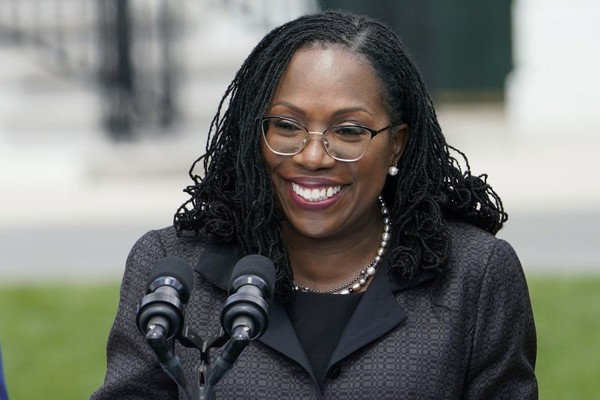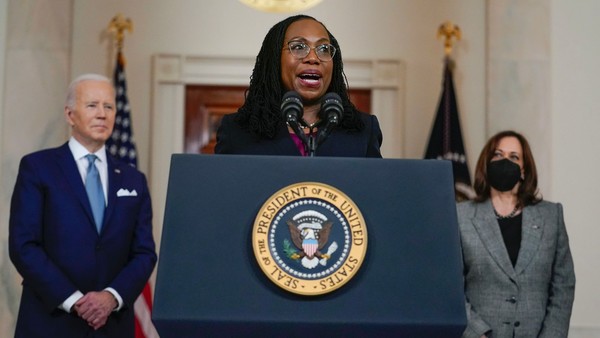
On June 30th, 2022, Justice Ketanji Brown Jackson was sworn in to the Supreme Court as the 116th Supreme Court justice and the first black woman to serve on the high court. The nine members of the U.S. Supreme Court serve lifetime appointments on the Court, in accordance with Article II of the United States Constitution. A vacancy occurs only after impeachment, death, or resignation. Following the resignation of the former Supreme Court Justice, President Biden nominated Jackson to the Court, and her inauguration was approved. When President Biden nominated her, he said, “For too long, our government, our courts haven’t looked like America.” He also added: “It is time that we have a court that reflects the full talents and greatness of our nation with a nominee of extraordinary qualification, and that we inspire all young people to believe that they can one day serve their country at the highest level.” The first black female Supreme Court Justice in the 233-year history of the United States signaled the beginning of change. Let's take a look at the life and achievements of Ketanji Jackson and think about the new history she will write.
Ketanji Brown Jackson was born on September 14th, 1970, in Washington, D.C -- her mother was a school principal, and her father was an attorney. She graduated from Palmetto High School in Miami, Florida, and won a national oratory title at the National Catholic Forensic League competition in New Orleans during her senior year. In her high school yearbook, she wrote that she “[wanted] to go into law and eventually have a judicial appointment.” After high school, Jackson majored in Political Science at Harvard University. Even when she was in college, her innate leadership and determination were outstanding. For example, when a student displayed a Confederate flag, which has been criticized as a symbol of racism, in a dorm window, Jackson led a student protest on behalf of the black student union. After graduating with her A.B., magna cum laude, in 1992, she worked as a reporter and researcher for Time Magazine for a year, then went on to Harvard Law School, and served as editor-in-chief of the Harvard Law Review, a very important law journal. Even though it is very difficult to balance working while studying, she earned her Doctor of Jurisprudence in 1996 with honors.
After graduating from law school, Jackson jumped into practice and worked as a judge and attorney in various law firms before being appointed Vice-Chairman of the United States Sentencing Commission in 2009. In 2012, Obama nominated Jackson to the federal district court in Washington, DC. As a district court judge, Jackson ruled on equality in the issue of executive privilege claims. For instance, she ruled before the impeachment inquiry committee hearing of former President Donald Trump's White House adviser Don McGahn as part of the committee's investigation into alleged Russian meddling in the 2016 presidential election. She pointed out that the president does not have the power to bar testimony and made a statement correcting the basics of democracy, saying, “The primary takeaway from the past 250 years of recorded American history is that presidents are not kings.”
Following the retirement of Justice Stephen G. Breyer on January 27th, 2022, President Joe Biden announced that he would nominate a black woman to the court. The decision drew criticism from conservatives and Republicans. At the Senate Judiciary and Judiciary Committee confirmation hearing held on April 7th, she was also asked racist, ridiculous, and contemptuous questions from white Republicans. But Jackson was unmoved. She only expressed her aspirations, saying, “I have dedicated my career to public service because I love this country, our Constitution, and the rights that make us free.” Officially inaugurated on June 30, upon Breyer’s resignation, Jackson began her term as the nation’s first black female Supreme Court justice.

In the 232-year history of the U.S. Supreme Court, 113 justices have served on the bench. Of those, 107 have been white men. It could not have been the feudal bare face of the highest authority of the ‘country of immigrants of various races’. However, in recent decades, the court has become more diverse. Almost half of its justices since 1990 have been women or minorities. Nonetheless, there was no instance in which a black woman served on the bench. “It has been taken 232 years and 115 prior appointments for a Black woman to be selected to serve on the Supreme Court of the United States, but we’ve made it! We've made it - all of us," Jackson said at a White House event the day after the Senate vote. According to an article published by NBC News in February 2022, “Jackson fits well with the Democratic Party and the progressive movement’s agenda due to her relative youth, background as a public defender, and history of labor-friendly rulings.” There were many twists and turns, but history took another step forward. The inauguration of Kentanji Jackson, the first black woman to the Supreme Court, is expected to have a positive impact on American society in the future.

